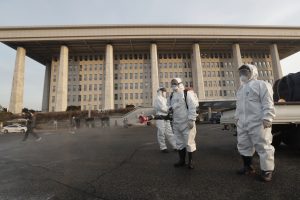South Korea’s forthcoming parliamentary elections, scheduled to be held on April 15, 2020, are being defined not only by the coronavirus (COVID-19) pandemic, but also by how the electorate perceives the effectiveness of the government’s actions during the crisis.
These are also South Korea’s first legislative elections after the presidential impeachment of 2017, when influence-peddling scandals and the mass popular protests that followed led to the ousting of then-President Park Geun-hye. As such, the electorate is now presented with an opportunity to signal support (or a lack thereof) to the administration of President Moon Jae-in, in power since May 2017. While Korean politics are notoriously mercurial, the results should offer an indication of which political grouping is better placed in the long run-up to the 2022 presidential elections. The two camps are led, respectively, by the ruling Democratic Party, whose main goal is to “complete the candlelight vigils’ reforms,” and the conservative coalition, centered around the United Future Party, which is critical of the Moon administration’s handling of relations with the United States and Japan, its dealings with North Korea, and its economic policies.
Foreign policy is a marginal concern for voters at present. After almost a year of growing tensions with Japan over historical disputes and the “comfort women” issue, which triggered a trade war and placed intelligence cooperation and the U.S.-ROK-Japan trilateral in jeopardy, the matter has been sidelined by the coronavirus pandemic. Similarly, North Korea hardly features in the campaigns, perhaps not a negative issue for the current administration, which invested significant political capital in engaging Pyongyang from early 2018 onward but with limited, if any, success. U.S. President Donald Trump’s attempts to get Seoul to increase its financial contribution to the ROK-U.S. alliance have also been muted of late.
Three issues are going to play a role in the upcoming elections. First, parliament passed new electoral laws in December 2019. Among other changes, a semi-mixed-member proportional system was introduced. A second bill lowered the legal voting age from 19 to 18 years old. Second, while electoral reform is intended to fix existing problems resulting from the first-past-the-post system for the candidates in the electoral districts and proportional representative system for the party lists, the main parties swiftly began setting up satellite parties for the allocation of seats according to the new system. Last but not least, the electoral campaign and the elections are now overshadowed by the pandemic crisis. Public perceptions of the government’s handling of the COVID-19 crisis will crucially shape the election outcome.

































